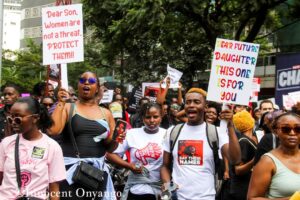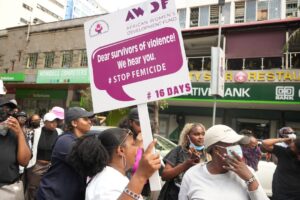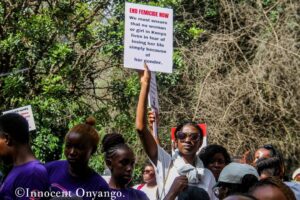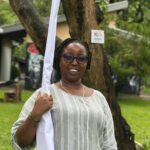Minds of the Movement
An ICNC blog on the people and power of civil resistance
by Perpetua KariukiSeptember 12, 2025
Femicide in Kenya is not just a crisis, it is a declaration of societal failure. Behind every murdered woman is a trail of state inaction, broken systems, and silenced voices. While the government’s response has long been characterized by neglect and indifference, communities and movements like Kongamano La Mapinduzi (KLM) are stepping in where institutions have failed. Today, the most urgent strategy for confronting this epidemic is community-led rapid response, a grassroots-based approach that prioritizes protection, documentation, and resistance.
The Strategy: Community-Led Rapid Response

Thousands marched across Kenya on January 27, 2024 to demand an end to femicide and violence against women. Credit: Innocent Onyango
Rapid response work is founded on a radical premise. The state has abdicated its duty to protect Kenyan women against any form of violence, and community members are forced to fill that gap. With the support of social justice centers like Kayole Community Justice Center (KCJC) and Mukuru Community Justice Center (MCJC), KLM has developed local networks capable of immediate intervention when cases of gender-based violence and femicide are reported.
These are not abstract frameworks. Community members in places like Kware, led by the Mukuru Community Justice Center, have mobilized themselves to retrieve bodies, conduct on-the-ground documentation, and create detailed reports that exposed institutional failure. They do what the police refuse to do: respond, with urgency and dignity.
The model is multi-pronged:
- Emergency action: When violence is reported, grassroots human rights defenders coordinate body retrievals, hospital visits, documentation, reporting, and safety measures for survivors or at-risk women.
- Monitoring: Grassroots human rights defenders track patterns of violence in their communities, map unsafe zones, and conduct participatory-based research on community members' attitudes and views on violence against women and their solutions for the safety of women in the community.
- Public awareness: The Community Justice Centers conduct community dialogues on how to identify early warning signs of gender-based violence and create a culture of collective vigilance.
Unlike bureaucratic mechanisms that are slow and removed from reality, these community-led rapid response strategies are embedded in the communities they serve. They are survivors, community organizers, and grassroots feminists armed not with institutional power but with passion and love for community.
Building Solidarity from the Ground
To scale the impact of rapid response work, several key strategies are being advanced:

Credit: Innocent Onyango
- Integrating community-led rapid response into national GBV strategies: Community rapid responders are collecting critical information often ignored by official bodies. Their documentation has with time been acknowledged as legitimate evidence and used to inform both law enforcement and policy reform.
- Establishing emergency shelters and safe houses: Many community rapid response efforts are undermined by the lack of safe places for survivors. Civil society continues to create well-resourced shelters for high-risk victims of gender based violence before these cases turn to femicide cases.
- Strengthening digital response systems: With violence often reported online before it reaches authorities, there are coordinated online-to-offline mechanisms that need strengthening so that they allow a strong digital alert mechanism that will trigger real-time community or institutional responses.
- Training and protecting responders: Many activists on the frontlines face threats, especially when dealing with powerful perpetrators or corrupt law enforcement. Protection frameworks and trauma-informed training are critical to ensure their safety and sustainability.
Challenges on the Frontlines
The community-led model, while powerful, faces significant challenges. Security risks are constant. Community human rights defenders face threats, harassment, and even physical harm for simply doing the work that police should be doing. Without adequate protection, the model becomes difficult and unsustainable. Burnout and trauma are also common as responders confront grief and violence daily without adequate mental health support. Without mental health support and strong community and institutional backing, many become emotionally overwhelmed and experience vicarious trauma.
Institutional resistance is another challenge. There is a notable lack of institutional cooperation as state agencies undermine or ignore the efforts of community-led initiatives, dismissing reports, shielding perpetrators, and leaving communities to fend for themselves. Resource constraints further limit the work, since most initiatives are unfunded or reliant on short-term grants. With steady investment, these grassroots human rights defenders could prevent much more violence than they currently do.
Lastly, it’s important to recognize that in deeply patriarchal and culturally retrogressive areas, some community members resist interventions, especially when perpetrators are known or respected figures. These regressive cultural practices, stigma, and silence continue to shield violence.
Resistance is Infrastructure
KLM’s work shows that resistance is not just protest, it’s infrastructure. It’s having the systems in place to protect women before the police arrive, if they ever do. From documenting abuse in real time to physically escorting at-risk women to safety, rapid response teams are building an alternative vision of justice.

Femicide is not inevitable; it is preventable. Credit: Innocent Onyango
One of the most important lessons learned is that prevention is collective. Women are safest when the entire community is trained and mobilized to care, intervene, and resist together. Femicide is not inevitable; it is preventable when action is fast, feminist, and rooted in the ground.
Another key insight is the power of public pressure. The January 2025 formation of a Presidential Technical Working Group on GBV came not from political goodwill, but from unrelenting activism. Street protests, digital campaigns, and survivor testimonies forced a reaction from a system that had long chosen silence.
But as KLM consistently warns, technical working groups and new policies mean nothing without implementation, transparency, and accountability. Community-led responses are the stopgap, not the solution.
The Path Forward
KLM’s vision is bold: a Kenya where every woman is safe, where femicide is treated as a national emergency, and where communities do not have to choose between silence and death. Until then, the work continues. Kenya cannot afford to normalize the mass killing of women. Each femicide is a rupture in our shared humanity, a reflection of how deeply our systems have failed. But from the pain, resistance grows.
In the echoes of the unheard, a new chorus is rising fierce, feminist, and unafraid. And in the face of silence, KLM and its allies are choosing to speak, to act, and to build the justice the state refuses to deliver. Because every woman’s life is sacred. And every second counts.

Perpetua Kariuki
Perpetua Kariuki is a Kenyan human rights defender, socialist feminist, and community organizer. She co-founded the Kayole Community Justice Center in Nairobi and serves on the leadership of Kongamano La Mapinduzi, challenging oppression and building grassroots resistance for justice and liberation.
Read More